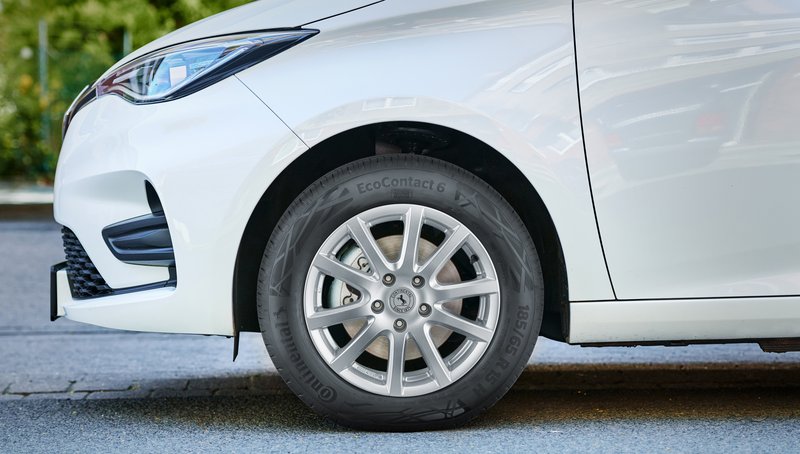Sustainable tires for electric mobility
Continental is using its decades of experience in development and combining it with findings from a variety of practical tests and collaborations to adapt its entire tire portfolio to the specific requirements of drive systems beyond combustion engines. In essence, the aim here is to achieve continuous optimization in terms of safety, efficiency and comfort. Besides brake performance, the decisive characteristics for electric vehicles are primarily tire life, interior noise and rolling resistance. According to research by Continental, tires are responsible for up to 20 percent of a vehicle’s total resistance.
For electric cars, where efficient driving is a priority, low rolling resistance is particularly important, as it contributes significantly to reducing energy consumption and achieving the greatest possible range. Using complementary technologies such as ContiSeal and ContiSilent, Continental also meets all the specific requirements that manufacturers place on tires when making their vehicles electric. ContiSilent technology reduces the sound components of rolling noise that are perceived as particularly intrusive by up to nine decibels, which roughly corresponds to the sound of a rustling leaf. With ContiSeal technology, 80 percent of all tire damage is immediately repaired by means of a viscous adhesive layer within the tire tread that automatically seals punctures caused by glass shards, nails or stones with a diameter of up to five millimeters. This eliminates the need to carry a spare wheel in the vehicle. All the company’s current tire lines are now designed for use on electric cars. Seven of the world’s 10 highest-volume manufacturers of electric vehicles trust in Continental tires for their original equipment. Renowned brands such as Tesla, Porsche, Mercedes-Benz, Polestar, Kia, BYD and Ford equip their new cars with Continental tires ex works.
To make the tires of the future even more sustainable to produce, use and recycle, a wide variety of Continental experts in research and development are already working on new tire concepts. Based on Continental’s standard EcoContact 6, a tire for the ID.Life concept car from Volkswagen was premiered at the IAA MOBILITY 2021 in Munich. Through the targeted use of renewable and recycled materials, which account for 37 percent of the tire, valuable resource savings are achieved along the entire value chain. At the same time, the responsible sourcing of raw materials contributes to minimizing ecological risks and improving the situation of local people. The Conti GreenConcept, which consists of more than 50 percent sustainable materials such as natural rubber from dandelions and silicate from the ashes of rice husks, goes one step further. As well as using a significantly reduced proportion of crude-oil-based materials, the tire is made from recycled materials such as processed steel and carbon black. In an industry first, Continental also uses polyester from recycled PET bottles in the tire’s casing. In the spring of 2022, Continental became the first tire manufacturer worldwide to start volume production with its ContiRe.Tex technology. In addition to a high share of renewable and recycled materials, the Conti GreenConcept sets new standards with its innovative lightweight technology. Weighing just 7.5 kilos, it is up to 40 percent lighter than a standard tire today. Both of these concepts underline Continental’s ambitious goal to become the most progressive tire company in terms of ecological and social responsibility by 2030.





